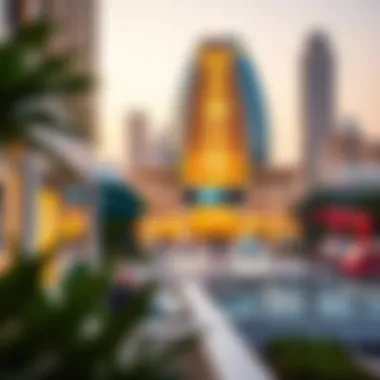Impact of Expo on Dubai's Real Estate Market


Intro
In recent years, Dubai has emerged as a significant player on the global stage, particularly with its impressive skyline and ambitious urban plans. Much of this development excitement can be traced back to major events like the World Expo. These gatherings aren’t just opportunities for nations to showcase their accomplishments; they also act as powerful catalysts for the local economy, including the real estate market. With an eye towards the future, it’s vital to explore the marked effects of Expo events on Dubai’s property dynamics.
Understanding the impact of Expos on real estate involves examining how they drive investments, stimulate architectural innovation, and influence property trends in the emirate. This article delves into key aspects, such as emerging neighborhoods, high-return investment opportunities, and the multifaceted market landscape.
As we venture through these themes, readers—ranging from real estate investors to developers and homeowners—will grasp the fundamental shifts occurring in Dubai’s real estate sector, largely fueled by Expo initiatives. Let's gear up to dissect the layers of this opulent market, understanding the forces at play and the prospects that lie ahead.
Preamble to Expo and its Relevance
The landscape of Dubai's real estate is not merely a canvas of high-rises and sprawling developments; it is significantly influenced by major international events known as Expos. These exhibitions represent a convergence of culture, technology, and commerce, transforming how we perceive urban living and interconnectedness in cities worldwide.
Expos are vital for several reasons, especially in the context of Dubai. They serve as catalysts for growth, drawing global attention and investment. For investors, understanding how Expos can shape market dynamics is crucial. This theme resonates particularly well against the backdrop of Dubai's ambitious vision, exemplified by its hosting of the Expo 2020, which, despite being postponed due to the global pandemic, continued to draw interest and speculation.
Within this section, the exploration turns towards defining the concept of Expo in relation to what it has meant for Dubai. This lays the foundation for understanding not just the immediate impact of these events, but also their longer-term significance on the next wave of urban and real estate developments.
Defining Expo in the Context of Dubai
To grasp the essence of an Expo, it’s crucial to appreciate its core purpose: bringing nations together to showcase advancements and foster international dialogue. In Dubai, this concept has evolved beyond just a showcase. Expo's hosted here represent a merging of innovation and enthusiasm—a bridge connecting global investors and audiences with local development.
For Dubai, being home to an Expo is not just about hosting an event; it is about positioning itself as a global hub. Each Expo provides an opportunity for dynamic engagement across sectors such as technology, culture, and sustainability, providing insights that influence how investors and stakeholders formulate strategies in real estate and beyond.
Historical Evolution of Expos in the City
The history of Expos in Dubai is relatively brief yet impactful. The journey began with its early aspirations toward global recognition, gathering momentum with notable events such as the 2020 Expo set to celebrate diversity and innovation. The city developed a framework that encouraged collaboration, resulting in a vibrant atmosphere for business and tourism.
- 1980s: Dubai started laying the groundwork, introducing international trade events to showcase its potential.
- 1997: The city hosted its first significant global exhibition, signaling its intentions to compete on an international stage.
- 2020: Positioned as a transformative event for the city, it was poised to make significant waves in the real estate sector by drawing millions of visitors and heralding new investment opportunities.
The evolution reflects not just the growth of Dubai's infrastructure but the broader narrative of economic diversification and global outreach. Thus, Expos represent pivotal points in Dubai's story, showing how international engagement can reshape the urban environment and influence property markets. This evolution underscores the importance of being attuned to international events as they continue to play a crucial role in shaping the future trajectory of Dubai's real estate landscape, making it essential for investors and stakeholders to stay informed and engaged.
"Expos are not just events; they are a lens to view the dynamism and resilience of a city. For investors, this visibility can unlock fresh opportunities, especially in real estate."
Economic Impact of Expo on Dubai's Property Market
The economic impact of Expo on Dubai's property market is not merely a ripple in a large pond; it's more like dropping a stone into a still lake, creating waves that influence various sectors beyond real estate. The Expo serves as a powerful catalyst for growth, prompting significant investments, driving demand in rental markets, and shifting long-term property trends. Understanding this impact is crucial for investors, agents, developers, and homeowners alike, as it not only highlights current opportunities but also illuminates future potential within Dubai's evolving real estate landscape.
Boosting Investments in Real Estate
When Expo began in Dubai, it was like flipping a switch and instantly lighting up the entire market. Investors worldwide began to see Dubai as a place brimming with opportunities, particularly in real estate. Foreign direct investment (FDI) saw a marked increase, with many global entities establishing a foothold in Dubai. This was especially prominent in sectors such as residential, commercial, and hospitality.
A striking example is the area around the Expo site itself, which has transformed from underdeveloped land into a sought-after hub for residential and commercial projects. Key aspects that have led to this investment boom include:
- Infrastructure development: The extensive infrastructure improvements made in anticipation of the Expo, including roads, public transport, and utilities, increase the attractiveness of the surrounding areas.
- Government incentives: The UAE government introduced various incentives to encourage investment, such as relaxed visa rules for investors and entrepreneurs, as well as a ten-year residency visa for investors and skilled workers. This has paved the way for a surge in property purchases.
- Global exposure: The global spotlight on Dubai during the Expo promotes not just tourism but also real estate investments. The event attracts millions of visitors, many of whom consider investing in the burgeoning property market.
In summary, the Expo has acted as a beacon of opportunity, driving significant capital influx into the real estate sector, thus encouraging a diverse pool of investors to consider Dubai as a prime locale.
Influence on Rental Prices and Property Demand
The growing attention from investors has inevitably influenced rental prices and property demand across Dubai. With new developments springing up to accommodate the influx of businesses, job seekers, and expatriates, landlords are facing an evolving tenant landscape.
Key factors affecting rental prices include:
- Increasing demand for housing: The Expo has led to a spike in demand for housing near key areas of development, which affects rental rates. Areas like Dubai South have seen a particularly sharp increase in rental prices due to their proximity to the Expo.
- Economic growth: As jobs multiply in sectors spurred by the Expo, more individuals flock to the city, further increasing the demand for housing. This influx has nudged average rental prices upward, creating both opportunities and challenges for tenants and landlords.
- Emerging affluent areas: In response to the demand, several neighborhoods are witnessing rapid development. Areas once considered modest are now seeing a transformation, which prompts property owners to adjust rental prices to match new market expectations.
"An upsurge in population invariably means heightened demand for rental properties, which in turn drives prices and becomes a significant driver in the broader economic ecosystem."
As the property market evolves post-Expo, understanding these rental dynamics becomes essential for investors and renters alike. It’s not just about the immediate effects; it’s about recognizing long-term trends that will shape Dubai’s future in the years to come.
Architectural Innovations Spurred by Expo Projects


The Expo in Dubai has not just been a mere exhibition center but has turned into a vibrant catalyst for architectural innovations. This significance stems from a blend of cultural exchange and technological advancement that reshapes the urban landscape. Projects born from Expo initiatives often set benchmarks for design, sustainability, and functionality.
The need for inventive solutions to cater to vast crowds while ensuring aesthetics and usability drives architects and developers to think outside the box. For Dubai, which is already known for its audacious architectural feats, Expo serves as a proving ground for future real estate endeavors. The ripple effects of these innovations often cascade, influencing both commercial and residential properties in the years following the dust of Expo’s closing settles.
Iconic Structures and Their Significance
Among the standouts in architectural ingenuity are the many iconic structures that have emerged from the Expo initiatives. Buildings like the UAE Pavilion and the Terra – The Sustainability Pavilion – are illustrative of a shift towards more meaningful forms of architecture. The striking designs are not just about looks; they encapsulate narratives that resonate with the themes of progress and sustainability.
These structures make powerful statements that blend functionality with cultural narratives. When people visit these sites, it's not just about physical structure; it’s also about the underlying message. For instance, the UAE Pavilion is a visual delight that also educates visitors about the country's heritage and commitment to innovation.
Moreover, these iconic structures have a purpose beyond the event. They aim to leave a lasting impact on visitors and can transition into community centers, museums, or offices. The legacy of the Expo's architecture extends as a reminder of the past while paving the way for future developments.
Sustainability Initiatives in Construction
In today’s world, where climate change is very much a pressing concern, the Expo initiatives are also underpinned by robust sustainability principles. Sustainable construction practices prioritized during these projects champion environmentally friendly materials and innovative designs that reduce energy consumption. The push for green solutions is crucial not just for aesthetic purposes but also for setting industry standards in real estate development.
Construction methods incorporating renewable energy, waste reduction, and water conservation are now more prevalent. For example, the advent of solar panels on rooftops and smart building technologies creates a model that integrates luxury living with environmental consciousness.
Sustainable practices don’t just benefit the environment; they also enhance property values, making them attractive for long-term investments.
This innovative approach to construction aligns with Dubai's vision for a sustainable future, contributing positively to the city’s overall carbon footprint.
As architects continue to push boundaries, the architectural innovations spurred by Expo projects are set to redefine the real estate landscape not just in Dubai, but potentially inspire global change in urban living. By intertwining culture, functionality, and sustainability, these projects hold the key to a future where real estate evolves with the environment and society’s needs.
Real Estate Trends Post-Expo
The aftermath of Expo in Dubai has reshaped the real estate landscape, making it essential to explore how this global event has influenced property trends. The investment climate is vibrant, with new opportunities surfacing as a direct outcome of the Expo's impacts. It’s not just about the immediate effects; it’s about long-lasting changes in how real estate operates in this bustling city.
Emerging Neighborhoods and Developments
With the Expo leaving a mark, various neighborhoods have stood out as prime areas for investment and development. Areas such as Dubai South and Expo Village have experienced a significant surge in interest. Investors are keen to tap into these regions, as they are positioned to benefit directly from the infrastructures put in place for the Expo.
- Dubai South: Designed to accommodate large-scale logistics and residential requirements, this area has attracted both local and international buyers. Its proximity to the Expo site enhances its desirability.
- Expo Village: Serving as a temporary home for Expo participants, this location is transitioning into a vibrant residential area, mixing commercial and residential spaces.
The rise of these neighborhoods signals the shifting dynamics in Dubai's property market. Buyers are more inclined towards areas that promise both community engagement and accessibility. Investing in these emerging hotspots not only offers immediate returns but also marks the beginning of a sustainable growth trajectory.
Shifts in Buyer Preferences
The Expo has also instigated notable shifts in buyer preferences among investors and homebuyers alike. A few key considerations have surfaced in this evolving landscape:
- Sustainability: Homebuyers today are increasingly looking for properties that focus on sustainable living. Buildings that highlight eco-friendliness are in higher demand, aligning with global trends towards greener lifestyles.
- Amenities and Lifestyle: Buyers are prioritizing neighborhoods that provide a plethora of amenities. Access to schools, shopping, leisure activities, and green spaces is influencing where people choose to live. Properties offering innovative designs and communal spaces gain an edge.
- Connectivity: With transportation infrastructure improvements stemming from the Expo, buyers are now more favorable toward properties that provide easy access to metro stations and major roadways.
It is evident that the preferences of buyers have shifted significantly, and investors have taken note. Understanding these trends is crucial for anyone looking to make informed decisions in Dubai's post-Expo real estate market. As such, adapting to these changes will undoubtedly shape the future successes within this sector.
"Foresight in the real estate market is as crucial as hindsight; knowing where the ball is heading could make a world of difference."
Impact on Commercial Properties
The significance of Expo in shaping the commercial properties landscape in Dubai cannot be overstated. This grand event acts not just as a showcase for cultural exchange but also as a fulcrum that drives economic activity and transforms urban environments. Given the sweeping implications, understanding its impact on commercial real estate offers a lens into the future of business opportunities in Dubai.
Expansion of Business Hubs Around Expo Venues
As Expo events unfold, they act as a magnet, drawing businesses toward their vicinity. The transformation of areas surrounding the Expo venues into vibrant business hubs is no mere coincidence. For instance, locations like Dubai South have transformed into bustling commerce centers thanks to their nearness to the Expo site. This proximity enhances visibility and accessibility, making it an attractive proposition for companies involved in various sectors—from technology to retail.
The infrastructure developments accompanying this event play a crucial role too. Enhanced transport links, such as new metro lines and improved road networks, facilitate easier access for not only businesses but also customers, improving foot traffic.
Moreover, the influx of international visitors during the Expo creates an allied demand for varied services and products. Companies are seizing this opportunity to establish themselves in areas where the potential client base is rapidly expanding. Many entrepreneurs are stepping up, establishing startups and medium enterprises that cater directly to this swelling audience.
Opportunities for Retail Developments


With the surge in visitors and businesses comes a golden opportunity for retail development. As commercial spaces grow, retailers see a chance to carve out its niche in a burgeoning marketplace. Properties near Expo venues are experiencing unprecedented demand, with new shopping complexes and dining options sprouting up almost overnight.
Developers are keen to tap into this emerging retail landscape, understanding that location, combined with the right mix of offerings, can lead to substantial profits. For example, the phenomena of pop-up stores has gained ground, allowing brands to test the waters in bustling neighborhoods at Expo locations. These short-term ventures create a buzz and allow retailers to connect with culturally diverse audiences virtually instantly.
"As Dubai strives towards becoming a prominent global trade hub, Expo-backed retail opportunities are likely to draw investors keen on securing a slice of this booming market."
Investors also note the potential for long-term benefits. As these areas develop into established retail hotspots, the properties can appreciate significantly, making them lucrative assets over time. In turn, this creates a cycle of investment and growth, ultimately reinforcing Dubai's status as a premier international business destination.
In summary, the Expo has catalyzed a substantial evolution in the commercial property landscape. From the formation of dynamic business hubs to exciting retail opportunities, it encourages a diversified and thriving economy, thus making it essential for stakeholders to stay informed and engaged as these developments unfold.
The Role of Government Policies in Shaping Expo Outcomes
Government policies act as the backbone of any extensive projects like Expo, particularly in a rapidly developing landscape such as Dubai. They establish the parameters within which real estate projects can flourish or falter. Successful Expos do not just showcase innovations but require robust regulatory frameworks that foster an environment ripe for investment and development. In the case of Dubai, these policies have been pivotal in shaping expectations, guiding investments, and ensuring the sustainability of various Expo-outcomes.
Regulatory Framework Enhancements
In the context of Dubai's Expo influence, regulatory framework enhancements are not merely formalities; they represent strategic advancements that exhibitors and investors depend on. To begin with, clarity in policies enhances investor confidence. When the rules of the game are transparent, both local and foreign investors are more likely to commit capital. Furthermore, regulatory enhancements have historically included expedited permit processes, streamlined zoning laws, and improved property rights protections—all of which collectively lower barriers to entry for new developments.
- Zoning Flexibility: Adjustments in zoning regulations often facilitate mixed-use developments that combine residential, commercial, and hospitality spaces, ensuring that investments are not limited to traditional formats.
- Enhanced Sustainability Standards: The government has increasingly implemented sustainability standards as part of the regulatory framework. Such standards encourage developments that are not only innovative but also environmentally conscious, aligning with global trends.
- Investment Guarantees: Policies that provide safety nets for foreign investments, such as guarantees against expropriation, can attract those wary of the risks in emerging markets.
These enhancements create an environment that nurtures a diverse array of real estate projects, making it appealing for stakeholders to jump on board.
Incentives for Real Estate Investors
In the hustle and bustle of Expo-enhanced growth, incentives tailored for real estate investors stand out like a beacon of hope amid uncertainty. These incentives often include tax breaks, reduced registration fees, and specific financing options that empower developers and investors to seize opportunities. The alluring prospect of significant returns on investment has been a driving force behind Dubai's real estate boom post-Expo.
- Tax Incentives: Offering tax exemptions for a defined period can significantly reduce operational costs for real estate businesses involved in Expo-related projects. This is crucial for enticing international investors looking to optimize their financial outlay.
- Streamlined Financing Options: Partnerships between the government and financial institutions can lead to tailored financing solutions that cater specifically to Expo projects, allowing for more adaptable payment structures.
- Marketing Support: Government backing through marketing and promotional efforts can help increase visibility for new developments, thus driving demand indirectly.
"Incentives have a multiplier effect; when they are executed thoughtfully, they can catalyze an entire market segment to take action."
These incentive programs effectively dispel hesitation among investors, encouraging them to act. It’s no secret that these policies not only attract investment but also retain it, ensuring long-term viability and a continuous flow of innovative projects in Dubai’s real estate sector.
Cultural Exchange and Community Development
Cultural exchange and community development hold profound significance in the context of Dubai's evolving real estate landscape. The very essence of Expos lies in their ability to bring diverse cultures together—creating a melting pot that fosters understanding and collaboration. When we talk about the impact of Expos on realty, we cannot ignore how they catalyze cultural dialogues, which in turn shape communities and influence property markets.
Promotion of Multiculturalism in Realty
One of the standout features of Expos is their emphasis on multiculturalism. Each event serves as an international stage, promoting a dialogue among nations through various exhibitions, performances, and networking opportunities. This exchange of ideas and values not only enriches the cultural tapestry of Dubai but also reflects on its real estate offerings.
Investors and developers are keenly aware that in this city, the appeal of a property often hinges on the communities surrounding it. Areas that celebrate multiculturalism tend to attract a diverse clientele, leading to a more vibrant neighborhood. This can translate into a lucrative real estate market, characterized by high demand for properties that embrace this diversity.
Consider, for example, the various cultural districts that have sprung up in the wake of Expo events. Areas like Al Quoz or the upcoming Dubai Creek Tower project embody this spirit, offering spaces that cater to varying tastes and lifestyles. With open arms, they welcome not just residents, but also businesses that thrive on such diversity.
Enhancing the Urban Fabric of Dubai
The impact of Expos on the urban fabric of Dubai cannot be overstated. Not only do they provide a platform for showcasing architectural innovation, but they also drive community development initiatives. The infrastructure improvements that accompany Expo events often lead to enhanced public spaces, transportation systems, and amenities, which shape the way residents interact with their environment.
- Public Spaces: Parks and recreational areas that foster a sense of community.
- Connectivity: Enhanced public transport options that make commuting easier across multicultural neighborhoods.
- Amenities: Development of retail and dining options that celebrate global cuisines and cultures.
These features serve to create a more cohesive urban environment that not only attracts investors but also enriches the lives of residents. With streets that resonate with the vibrancy of different cultures, Dubai becomes not just a place to live, but a place to belong.
Investment Opportunities Linked to Expo
The Expo, while being a grand showcase of nations and cultures, has layered impacts on Dubai's real estate investment landscape. Its significance lies not only in the immediate boost it provides but also in the long-term structures it sets in place for investors and developers.
Understanding investment opportunities linked to Expo involves digging into various factors. These factors can range from infrastructural developments, regulatory changes, and even the cultural shifts that occur during such international events. When ordinary individuals and seasoned investors look at property investments, analysing these elements can not only protect their financial interests but also maximize potential gains.
One should note several specific benefits of investing during this period:


- Heightened Demand: With a surge in visitors and expatriates during and after the Expo, there emerges a vibrant demand for residential and commercial spaces. This can translate into better occupancy rates for landlords and higher returns for investors.
- Government Support: The UAE government often rolls out incentives to promote foreign investment during Expo years. This can include tax benefits or streamlined processes for property ownership.
- Infrastructural Boom: Large-scale projects related to Expo, like roads, public transport systems, or leisure spots, can enhance property values significantly, making investments during this time attractive.
Strategies for Thoughtful Investment
Navigating through the myriad of investment avenues during the Expo demands a clear, informed strategy. Here are some guidelines that can foster thoughtful investments:
- Research the Neighborhoods: Identifying emerging neighborhoods that are either newly developed or undergoing revitalization can lead to fruitful investments. Areas nearby the Expo venue often get additional attention, driving up property values.
- Focus on Sustainability: Investors should look for projects that emphasize sustainability and smart living. As the world steps into a new era prioritizing eco-friendliness, properties that meet these criteria can command higher valuations.
- Consider Rental Yield Potential: Given the influx of tourists and business professionals during Expo, properties in strategic locations might offer exceptional short-term rental yields. Understanding local short-term rental regulations becomes essential in this context.
Long-term Predictions for Value Appreciation
When discussing the long-term predictions for value appreciation tied to Expo events, several trends come into play:
- Post-Expo Infrastructure Legacy: The facilities and infrastructural development stemming from the Expo will likely stay and serve the community long after the events. These investments can lead to sustained demand for real estate in those areas.
- Increased Tourism: A successful Expo often translates into increased tourism in subsequent years. Investors can expect that cities showcasing successful Expos may see a continual rise in property values, especially in mixed-use developments that cater to both tourists and permanent residents.
- Cultural Landmarks: Properties near iconic structures built for the Expo can experience premium returns. Investors should pay close attention to those landmarks as a gauge for potential appreciation.
"Investing during monumental events like the Expo is a bit like planting a tree. The right conditions today can yield luscious fruits years later."
Challenges and Risks Associated with Expo-related Investments
Understanding the challenges and risks associated with Expo-related investments in Dubai is crucial for stakeholders in the real estate sector. While the Expo presents numerous opportunities for growth, it’s equally important to recognize the potential pitfalls that might affect property investment decisions.
Market Volatility and Economic Downturns
Investors often find themselves navigating a turbulent sea when it comes to market volatility. The ripples caused by external economic factors can profoundly impact property values and rental yields. For instance, fluctuations in oil prices, which play a significant role in the UAE's economy, can lead to unpredictable changes in investor sentiment. A downturn in the global economy could make investors wary, resulting in a freeze in property purchases and an accompanying decline in market demand.
Moreover, the aftermath of Expo can bring uncertainties. Post-event, the initial excitement may wane, and this dip in interest could lead to a decrease in tourism and expatriate population growth, both of which are essential for sustaining the real estate market. Prudent investors should closely monitor economic indicators, as well as local and international market trends, to better prepare for sudden changes in demand.
Ensuring Sustainability in Development Projects
A growing awareness of environmental issues is prompting a shift towards more sustainable development practices. As such, ensuring sustainability in development projects has become a paramount consideration for investors. While the Expo showcases cutting-edge architecture and infrastructure, the challenge lies in replicating these features in the long-term real estate market.
Investors should be cautious when assessing properties linked to Expo projects. Ensuring compliance with sustainability standards can sometimes lead to increased initial costs, which might deter some developers. Furthermore, if sustainability is not adequately addressed, properties may face penalties or fail to attract tenants who prioritize eco-friendly living.
“The best investment is one that not only brings returns but also aligns with sustainable principles for a better future.”
To mitigate these risks, stakeholders must engage with eco-friendly practices right from the planning stage. This could involve seeking certifications like LEED (Leadership in Energy and Environmental Design), which can enhance a project's marketability in an increasingly environmentally-conscious world. In addition, investors should look for developments that seamlessly integrate green technologies, as such features tend to have better long-term investment potential.
Navigating through the challenges and risks linked with Expo-related investments in Dubai requires a careful eye and astute understanding. Investors who remain informed and proactive about market trends and sustainability will be better equipped to thrive in this dynamic real estate landscape.
Future Prospects for Dubai's Real Estate Post-Expo
The landscape of Dubai's real estate is undergoing a transformative phase, especially since the culmination of the Expo. The future prospects are not just bright; they are brimming with opportunities and challenges in equal measure. This period marks a pivotal moment for investors, developers, and homeowners alike. The Expo catalyzed various developments, setting the stage for future growth in infrastructure, tourism, and investment.
Expos historically leave a legacy that extends beyond the event itself. The infrastructure improvements, cultural exchanges, and economic boosts from such happenings create a fertile ground for future investment. This section examines the critical long-term urban development plans and the Vision 2040 initiative that frame the real estate future in Dubai.
Long-term Urban Development Plans
Long-term urban development plans in Dubai are engineered to accommodate an increasingly diverse population and economic landscape. The Expo has not only highlighted the city’s global status, but it has also spurred planners and developers to think big. As more businesses and multinational companies eye Dubai as a strategic location, urban sprawl is expected to keep up with the demand for housing and commercial spaces.
The authorities have laid out ambitious urban frameworks that focus on:
- Integrated Transportation Systems: Enhancing the connectivity of various districts while reducing traffic congestion, encouraging more sustainable mobility.
- Smart City Initiatives: Deploying intelligent systems to improve services and quality of life for residents, positioning Dubai as a tech-savvy urban environment.
- Green Spaces: Increasing parks and community spaces that contribute to a healthier lifestyle.
As urbanization continues at a breakneck pace, the need for efficient zoning laws and a commitment to sustainability will be paramount. This could attract eco-conscious investors and residents, essential for the long-term viability and appeal of Dubai's real estate market.
Vision and Beyond
Embracing a forward-looking approach, Dubai’s Vision 2040 emphasizes creating a competitive, sustainable economic landscape. This grand blueprint serves to enhance the quality of life for residents while attracting global talent and investment. It aims to:
- Diversify the Economy: Moving away from oil dependency, promoting sectors like tourism, technology, and green energy.
- Enhance Urban Living: Fostering inclusivity and enhancing the standard of living through improved facilities and services.
- Sustainable Development: Aligning growth with environmental goals, factoring in climate adaptability in real estate ventures.
The Vision envisions that by 2040, Dubai will be a leading global city, where real estate will not merely be a commodity but a dynamic component of a thriving urban ecosystem. Housing developments, commercial enterprises, and community projects that align with the city’s goals will offer a blend of economic stability and social responsibility. The created synergy could very well bolster property values and attract talents from various domains, further enriching Dubai's real estate portfolio.
"The Expo has opened doors for a future that is multispectral, where investment opportunities meet the demand for sustainable and innovative urban solutions."
In summary, the future of Dubai’s real estate post-Expo is poised for advancement, propelled by robust urban development plans and an ambitious Vision 2040. Investors who align their strategies with these frameworks can navigate the evolving landscape with confidence.















